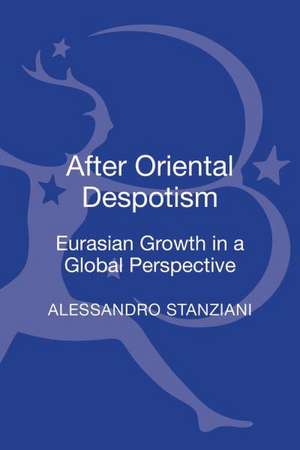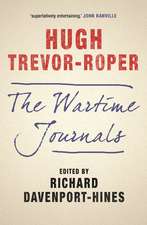After Oriental Despotism: Eurasian Growth in a Global Perspective
Autor Alessandro Stanzianien Limba Engleză Hardback – 30 iul 2014
| Toate formatele și edițiile | Preț | Express |
|---|---|---|
| Paperback (1) | 217.53 lei 6-8 săpt. | |
| Bloomsbury Publishing – 30 iul 2014 | 217.53 lei 6-8 săpt. | |
| Hardback (1) | 714.12 lei 6-8 săpt. | |
| Bloomsbury Publishing – 30 iul 2014 | 714.12 lei 6-8 săpt. |
Preț: 714.12 lei
Preț vechi: 830.37 lei
-14% Nou
Puncte Express: 1071
Preț estimativ în valută:
136.67€ • 142.15$ • 112.82£
136.67€ • 142.15$ • 112.82£
Carte tipărită la comandă
Livrare economică 15-29 aprilie
Preluare comenzi: 021 569.72.76
Specificații
ISBN-13: 9781472523532
ISBN-10: 1472523539
Pagini: 192
Ilustrații: black & white illustrations
Dimensiuni: 156 x 234 x 18 mm
Greutate: 0.45 kg
Ediția:New.
Editura: Bloomsbury Publishing
Colecția Bloomsbury Academic
Locul publicării:London, United Kingdom
ISBN-10: 1472523539
Pagini: 192
Ilustrații: black & white illustrations
Dimensiuni: 156 x 234 x 18 mm
Greutate: 0.45 kg
Ediția:New.
Editura: Bloomsbury Publishing
Colecția Bloomsbury Academic
Locul publicării:London, United Kingdom
Caracteristici
Gives a new dimension to our understanding of state formation, the slave trade and warfare
Notă biografică
Alessandro Stanziani is Director of Studies at the Ecole des Hautes Etudes en Sciences Sociales, France.
Cuprins
Introduction: The Scope and Aims 1. The Historical Dimension of Economic Backwardness2. Beyond Asiatic Despotism: Territorial Power and State Construction in Eurasia3. The Power of the Steppe: the Mongol Heritage and the Expansion of the Muscovy4. Slavery and Trade in Central Asia and Russia5. Nor Feudalism or Capitalism : Agrarian Markets under Coercion6. Beyond Economic Backwardness. Labor and Growth in Eurasia in the Long Nineteenth Century Conclusion : Russia in a Globalizing World Bibliography Index
Recenzii
By revisiting the history of Russia and Eurasia in the context of global history, Stanziani is successful in breaking a number of our preconceptions. Indispensable for those who are keen to reconsider the conventional narrative and understanding of the history of the world.
After Oriental Despotism is a fascinating and ground-breaking study of human bondage in Russia and Central Asia. This is a pioneering study of Russian serfdom in Eurasian context.
A wide ranging account that links power and the perception of power to the historical dynamics of Eurasian societies from the sixteenth century. Alessandro Stanziani is particularly instructive on labour controls and the related relationship between coercion and economic growth. An important work.
At a moment when some of the most repressive regimes see the fastest economic growth, it is time to revisit our cherished notions about the connections between freedom and economic development, between democracy and capitalism. To do so, Stanziani disentangles the economic history of Russia during the past few centuries -- usually considered to be exhibit A in any accounts of backwardness--and finds that its economic performance was much better than we have been led to believe and that it succeeded on the back of particularly coercive forms of labor mobilization, and autocratic political institutions. The disconcerting lesson of this path-breaking book is that economic growth can take on many different forms, and be channeled by very different institutions. Freedom, democracy and liberal institutions are neither a precondition for modern economic growth nor an automatic outcome of it. A must read for anyone interested in global economic history.
Balanced assessments and breadth of perspective. [This book] is a significant milestone in the history of Western disputes about the ways of Russian history
After Oriental Despotism is a fascinating and ground-breaking study of human bondage in Russia and Central Asia. This is a pioneering study of Russian serfdom in Eurasian context.
A wide ranging account that links power and the perception of power to the historical dynamics of Eurasian societies from the sixteenth century. Alessandro Stanziani is particularly instructive on labour controls and the related relationship between coercion and economic growth. An important work.
At a moment when some of the most repressive regimes see the fastest economic growth, it is time to revisit our cherished notions about the connections between freedom and economic development, between democracy and capitalism. To do so, Stanziani disentangles the economic history of Russia during the past few centuries -- usually considered to be exhibit A in any accounts of backwardness--and finds that its economic performance was much better than we have been led to believe and that it succeeded on the back of particularly coercive forms of labor mobilization, and autocratic political institutions. The disconcerting lesson of this path-breaking book is that economic growth can take on many different forms, and be channeled by very different institutions. Freedom, democracy and liberal institutions are neither a precondition for modern economic growth nor an automatic outcome of it. A must read for anyone interested in global economic history.
Balanced assessments and breadth of perspective. [This book] is a significant milestone in the history of Western disputes about the ways of Russian history













